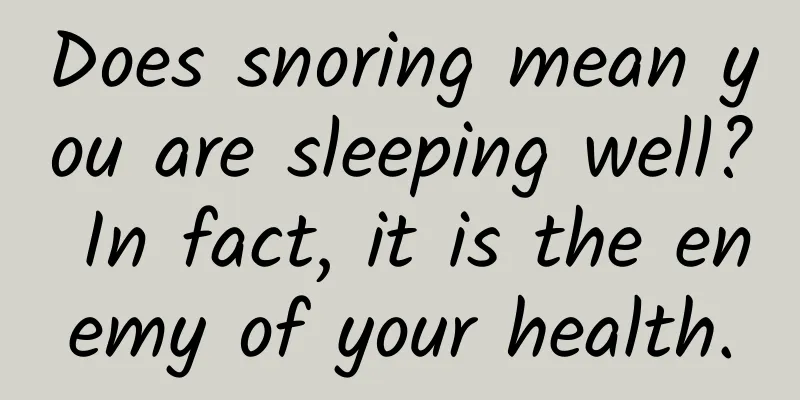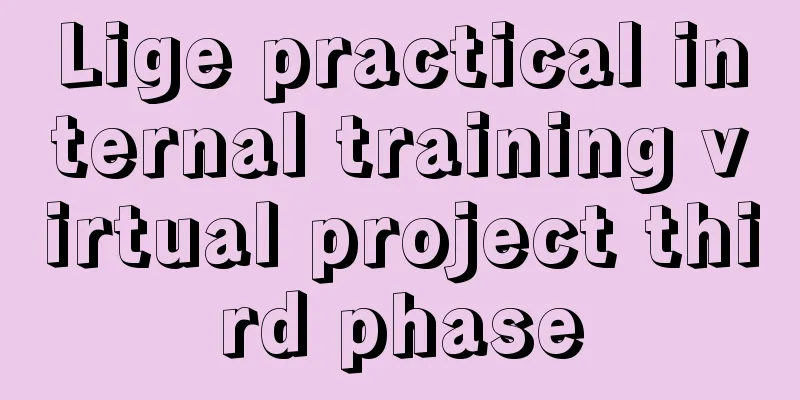Does snoring mean you are sleeping well? In fact, it is the enemy of your health.

|
Author: Lu Xiang, Chief Physician, Shaw Hospital Affiliated to Nanjing Medical University Reviewer: Guo Shubin, Chief Physician, Beijing Chaoyang Hospital, Capital Medical University Snoring, also known as "snoring" or "snoring syndrome", is a common phenomenon in life. Some people can fall asleep as soon as they lie down on the bed at night, and their snoring is very loud. Many people around them think that this is a sign of a good sleep. Figure 1 Copyright image, no permission to reprint But snoring is actually very harmful. Severe snoring may even be accompanied by sleep apnea, that is, when the snoring stops, breathing will also stop. Some people will suddenly wake up after a few seconds or even dozens of seconds. The incidence of this type of sleep apnea in the general population is 4% to 6%. People with sleep apnea have very poor sleep quality and are prone to dozing off during the day. In addition, the lack of oxygen caused by sleep apnea has a great impact on human health, easily leading to cardiovascular and cerebrovascular diseases, and even sudden death during sleep. Therefore, we need to be vigilant about snoring. Why do people snore? The cause of snoring is the narrowing of the airway. When we fall asleep, the muscles of our entire body relax, including those in our throat, which causes our airway to narrow. If the airway becomes too narrow, the airflow will become agitated instead of smooth, causing vibrations at both ends of the throat. When these vibrations become very obvious, a rough sound is produced, which the medical community calls "snoring." The narrower the airway, the louder the snoring [1]. This means that any cause that causes the airway to narrow may lead to snoring. Generally speaking, there are both physiological and pathological reasons. Obesity is one of the common physiological causes. Fat accumulates in the throat of obese people, narrowing the pharyngeal cavity, leading to snoring. In addition, excessive fatigue, smoking or drinking can also cause the throat muscles to relax after falling asleep, inducing or aggravating snoring. Pathological causes are more common in nasopharyngeal diseases, such as nasal polyps, hypertrophic nasal conchae, swollen tonsils, chronic pharyngitis, etc. These diseases can cause nasopharyngeal stenosis, resulting in poor airflow during sleep. In addition, central apnea caused by central nervous system tumors, trauma, stroke, encephalitis, etc. can also lead to snoring. According to statistics, people who snore account for 20% to 30% of the total population, and the proportion is even higher among middle-aged people. The probability of middle-aged and elderly snoring people suffering from high blood pressure, stroke and cerebral thrombosis is much higher than that of ordinary people. Moreover, as the pharyngeal muscles of the elderly relax, when combined with cerebrovascular disease, chronic obstructive pulmonary disease, cor pulmonale, etc., the tongue is more likely to fall back, and then apnea-hypopnea syndrome will occur. In other words, elderly people who snore are more likely to have symptoms of apnea. What is sleep apnea syndrome? When a normal person is sleeping, their breathing is deep, slow, even, and steady, and they do not make any sound. If the snoring is like thunder, intermittent, and has ups and downs, it indicates that the upper airway is severely obstructed. If you occasionally hold your breath, have difficulty breathing, or your breathing is interrupted or paused for several seconds or more than 10 seconds, you may experience hypoxia symptoms such as cyanosis of the lips, and you are often awakened during sleep. If you have more than 30 breathing pauses in 7 hours of sleep at night and each pause lasts more than 10 seconds, it is clinically diagnosed as sleep apnea syndrome. Figure 2 Copyright image, no permission to reprint Middle-aged and elderly people are at high risk of sleep apnea syndrome, with an incidence rate as high as 20% to 40%. People with sleep apnea syndrome snore during sleep and breathe with their mouths open, have frequent respiratory arrests, have restless sleep, and are repeatedly awakened from sleep due to suffocation. They may also experience angina pectoris, arrhythmia, or increased nocturia at night. These people are also very sleepy after waking up, and they will have symptoms such as high blood pressure and headaches after waking up. In the long run, snoring will not only increase the risk of cardiovascular and cerebrovascular accidents, but also cause memory loss, slow reaction, and even depression in some elderly people. What are some ways to prevent snoring in daily life? First, change your lifestyle, such as quitting smoking and drinking, and adjusting your sleeping posture. Smoking can damage the respiratory mucosa, aggravate respiratory symptoms, and worsen respiratory obstruction. Alcohol can reduce the movement of muscles around the upper respiratory tract and increase the risk of sleep apnea syndrome. Therefore, quitting smoking and drinking, especially avoiding drinking before bed, can better prevent snoring. In addition, try to avoid sleeping on your back. You can sleep on your side, which can open the airway and reduce snoring. Figure 3 Copyright image, no permission to reprint Second, do not eat too much before going to bed, especially for the elderly who suffer from gastroesophageal reflux. Pay attention to raising the head of the bed appropriately to avoid choking and aspiration caused by refluxed food. Third, try to use less sedatives and hypnotics to aid sleep before bedtime, especially for patients with chronic obstructive pulmonary disease or sequelae of cerebrovascular disease, so as not to aggravate the inhibition of respiratory center regulation. Fourth, obese people should control their diet and increase physical exercise. Only by losing weight and controlling weight can the problem of airway compression be solved most thoroughly. Fifth, the elderly should pay attention to blood pressure monitoring and take antihypertensive drugs on time to prevent sudden events such as myocardial infarction and stroke. Sixth, snoring patients should prevent colds and treat nasal obstruction diseases in a timely manner. Seventh, it is recommended that patients with severe snoring go to the respiratory department for sleep apnea monitoring and receive positive airway pressure ventilation, oral appliances or surgical treatment based on the results. In short, snoring is a respiratory disease that requires active prevention to maintain good health. If snoring is a temporary phenomenon caused by drinking, fatigue, taking medicine, etc., then no treatment is needed, and only the external cause of snoring can be removed. However, if you snore for a long time and have symptoms of nocturnal sleep apnea, especially the elderly, you should go to the hospital in time to find out the cause and receive appropriate treatment in time. References Richard Wiseman. Night Brain: The Secret of Automatic Learning During Sleep. Translated by Chen Lei. Hunan: Hunan Literature and Art Publishing House, 2018. |
<<: How to determine the winner in a battle for territory? Howler monkeys: Who roars louder?
>>: Leon Lederman: That weekend night, I figured out how to break parity.
Recommend
China Passenger Car Association: Light Commercial Vehicle Market Forecast Research Report in September 2022
1. Industry Insights Auman's new million-car ...
Being a performance king and a domestic pioneer, Raytheon helps China's independent science and technology take root
It can be the performance king and is also worthy...
Gaming on smartwatches: Break through or stop
Editor's note: I always think that making gam...
I really want to ask: Why did the "butt injection" that was popular when we were young disappear?
When you think of injections, do you think of &qu...
4 key points to quickly optimize the bidding OCPC delivery effect
In recent years, the competition for traffic in b...
Technology Morning News | Research shows drinking more coffee can prevent Alzheimer's disease
【Today’s cover】 Qilin Gorge is located in Qiongzi...
Suspended! Why is Super Typhoon Makar so terrifying? What is eyewall replacement?
Audit expert: Ye Haiying Deputy Director of the N...
In-depth analysis of activity operations: post-launch operation plan
First look at this picture: I divided the operati...
Is the $8 billion acquisition of Harman Samsung worth it?
Recently, Samsung has become the focus of attenti...
It took three years to get rid of the bangs on the iPhone. What’s wrong with it?
Recently, Jon Prosser, a well-known Apple whistle...
How to efficiently create a set of advertising creative materials?
How to design a good set of materials quickly and...
The void is calling you! This strange feeling actually exists!
Audit expert: Taozi National Psychological Counse...
Microsoft is smart to embrace Android and iOS
[[134845]] Since the new Microsoft CEO Satya Nade...
The latest notice on the resumption of work in Hubei: All types of enterprises shall resume work no earlier than 24:00 on March 10! Attached full text
Currently, the epidemic prevention and control in...
Apple lacks innovation capabilities. Didn’t Cook inherit the essence from Jobs?
During the Steve Jobs era, Apple phones have alwa...









